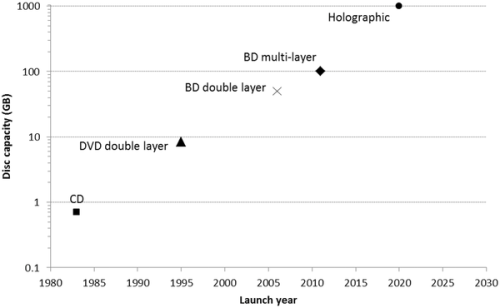“This research investigates the carbon footprint of the lifecycle of console games, using the example of PlayStation 3 distribution in the UK. We estimate total carbon equivalent emissions for an average 8.8-gigabyte game based on data for 2010. Two delivery scenarios are compared: the first examines Blu-ray discs delivered by retail stores, and the second, games files downloaded over broadband internet.”
“Contrary to current consensus that downloaded data will result in lower carbon emissions than distribution by disc, producing and distributing an average-sized game by Blu-ray disc in 2010 resulted in approximately 50 to 90% less emissions than downloading. The estimated carbon emissions from downloading only fall below that of Blu-ray discs for games smaller than 1.3 gigabyte. The study findings serve to illustrate why it is not always true that digital distribution of media will have lower carbon emissions than distribution by physical means when file sizes are large.”
“As internet efficiency and speeds increase, the carbon emissions of downloading versus Blu-ray discs may fall. This must, however, be considered against the trend for increasing game file sizes on next generation consoles. In October 2013, file sizes of the top ten selling games in Europe range between 1.3 and 24 gigabyte per game, with an average of 11 gigabyte. This average is larger than the average for 2010 of 8.8 gigabyte. The data capacity of optical discs has increased exponentially over the last two decades, and the energy required to produce different types of optical discs with different capacities has remained approximately the same at any point in time. Multilayer Blu-ray discs are now available that can store up to 100 gigabyte, and holographic technology that could store up to 1,000 gigabyte per disc is now available.”

Increases in disc capacity. BD = Blu-ray disc; DVD = digital video disc; CS = compact disc; GB = gigabyte.
“All Blu-ray discs distributed within Europe are manufactured in Salzburg, Austria. Discs are then distributed by truck and shipped to a central warehouse in Northampton, UK and subsequently to retailers’ warehouses ready for distribution to outlets and sold to customers. The study assumes that shoppers will travel by car to retail outlets and will buy a game along with nine other items. The carbon emissions of games distributed by Blu-ray discs are highly sensitive to the energy used by consumers traveling to shops.”
“If consumers purchase games along with many other items during a major shopping trip (e.g., 100 items), or use public transport to travel to the shops, the carbon emissions of Blu-ray disc production and distribution are between one quarter and one third lower. On the other hand, if consumers drive to the store specifically to buy a game (e.g., following a new game launch), then emissions for Blu-ray discs fall between lower and upper estimates for downloading. To put this in context, games of 5.4 to 19 gigabyte purchased as a sole item during a shopping trip would have carbon emissions in the same range as that for a download.”
“Carbon equivalent emissions of compact disc production and distribution in the United States is almost 3 times that of PS3 Blu-ray disc production in Europe. The higher emissions for optical disc production in the United States are mainly the result of the differences in transport and also differences in the carbon intensity of energy production and fuel use. Assuming Blu-ray disc production would be similar to CD’s, carbon equivalent emissions for Blu-ray discs in 2010 would only fall categorically below downloading for files above 11 gigabyte in the United States. The study findings can be considered broadly representative of PS3 games distributed within the EU and for larger-than-average files in the United States.”
Quoted from The Carbon Footprint of Games Distribution, Kieren Mayers, Jonathan Koomey, Rebecca Hall, Maria Bauer, Chris France, and Amanda Webb, in Journal of Industrial Ecology, September 2014. Via Yale Environment 360. Previously: Truckloads of Hard Discs: Imagine you put a portable hard disk of 500 gigabytes in your backpack and start walking. In which cases are you faster than your internet connection?






